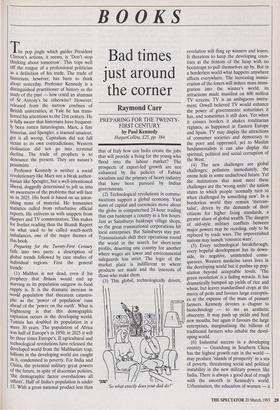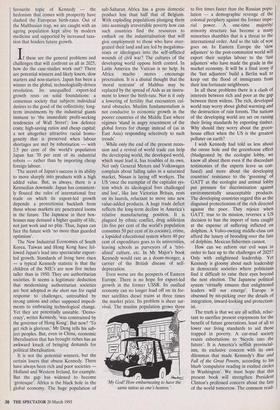BOOKS
Bad times just around the corner
Raymond Carr
PREPARING FOR THE TWENTY- FIRST CENTURY by Paul Kennedy HarperCollins, £25, pp. 384 The pop jingle which guides President Clinton's actions, it seems, is 'Don't stop thinking about tomorrow'. This trips well off the tongue of a professional politician as a definition of his trade. The trade of historians, however, has been to think about yesterday. Professor Kennedy is a distinguished practitioner of history as the study of the past — how could an alumnus of St Antony's be otherwise? However, released from the narrow confines of British universities, at Yale he has trans- ferred his attentions to the 21st century. He is fully aware that historians have frequent- ly been rotten futurologists. Marx, a fine historian, and Spengler, a learned amateur, got it all wrong. Capitalism did not fall victim to its own contradictions; Western civilisation did not go into terminal decline. The trade of prophets is to denounce the present. They are nature's pessimists.
Professor Kennedy is neither a social revolutionary like Marx nor a bleak author- itarian like Spengler, but a well-intentioned liberal, doggedly determined to jolt us into an awareness of the problems that will face US in 2025. His book is based on an aston- ishing mass of material. He humanises statistics culled from rebarbative official reports. He enlivens us with snippets from Harpers and TV commentators. This makes for livelier reading than the Brandt Report on what used to be called south-north imbalances, one of the major themes of this book.
Preparing for the Twenty-First Century falls into two parts: a description of global trends followed by case studies of individual regions. First the general trends: (1) Malthus is not dead, even if his Prophecy that Britain would end up starving as its population outgrew its food Supply is. It is the dramatic increase in world population that threatens catastro- phe as the 'power of population' runs ahead of the 'power on the earth'. What is frightening is that this demographic explosion occurs in the developing world. Tunisia has doubled its population in a mere 30 years. The population of Africa was half of Europe's in 1950; in 2025 it will be three times Europe's. If agricultural and technological revolutions have released the developed world from the Malthusian trap, billions in the developing world are caught in it, condemned to poverty. For India and China, the potential military great powers of the future, in spite of draconian policies, the demographic factor overshadows all others'. Half of India's population is under 15. With a gross national product less than
that of Italy how can India create the jobs that will provide a living for the young who flood into the labour market? The prospects of export-led growth are not enhanced by the policies of Fabian socialism and the primacy of heavy industry that have been pursued by Indian governments.
(2) Technological revolutions in commu- nications support a global economy. Vast sums of capital and currencies move about the globe in computerised 24-hour trading that can bankrupt a country in a few hours. Just as Sainsburys bankrupt village shops, so the great transnational corporations hit local enterprises. But Sainsburys stay put. Transnationals shift their operations round the world in the search for short-term profits, deserting one country for another where wages are lower and environmental safeguards less strict. The logic of the market place is indifferent to where products are made and the interests of those who make them.
(3) This global, technologically driven, So what exactly does your dad do?' revolution will fling up winners and losers. It threatens to keep the developing coun- tries at the bottom of the heap with no bootstraps to pull themselves up by. But in a borderless world what happens anywhere affects everywhere. The increasing immis- eration of the losers will induce mass immi- gration into the winner's world, its attractions made manifest on 600 million TV screens. TV is an ambiguous instru- ment. Orwell believed TV would enhance the power of governments: sometimes it has, and sometimes it still does. Yet when it crosses borders it shakes totalitarian regimes, as happened in Eastern Europe and Spain. TV may display the attractions of consumer societies and democracy to the poor and oppressed; yet to Muslim fundamentalists it can also display the spiritual, political and social corruption of the West.
(4) The new challenges are global challenges: pollution immediately, the ozone hole in some undisclosed future. Yet the institutions that must meet these challenges are the 'wrong units': the nation states to which people 'normally turn to when challenged by something new'. In a borderless world they remain 'mercan- talist', driven by the demands of their citizens for higher living standards, a greater share of global wealth. The dangers of old-style military conflicts between major powers may be receding, only to be replaced by trade wars. The impoverished nations may launch 'resource wars'. (5) Every technological breakthrough, every hopeful development has its down- side, its negative, unintended conse- quences. Western medicine saves lives in the developing world but it pushes up pop- ulation beyond acceptable levels. 'The green revolution' is a fading miracle. It has dramatically bumped up yields of rice and wheat, but leaves standardised crops at the mercy of pests and favours large enterpris- es at the expense of the mass of peasant farmers. Kennedy devotes a chapter to biotechnology — to me an aesthetic obscenity. It may push up yields and feed new mouths, but again it favours the large enterprises, marginalising the billions of traditional farmers who inhabit the devel- oping world.
(6) Industrial success in a developing country — Guandong in Southern China has the highest growth rate in the world may produce 'islands of prosperity' in a sea of poverty, threatening social and political instability in the new military powers like India. There is always a good deal of rough with the smooth in Kennedy's world. Urbanisation, the education of women — a
favourite topic of Kennedy — the hedonism that comes with prosperity have slashed the European birth-rates. Out of the Malthusian trap, we are caught with an ageing population kept alive by modern medicine and supported by increased taxa- tion that hinders future growth.
If these are the general problems and challenges that will confront us all in 2025, how do the case-studies work out? There are potential winners and likely losers, slow starters and non-starters. Japan has been a winner in the global, technologically-driven revolution. Its unequalled export-led growth rests on solid foundations: a consensus society that subjects individual desires to the good of the collectivity; long- term investments by the industrial giants immune to 'the immediate profit-seeking tendencies of Wall Street'; low defence costs; high-saving ratios and cheap capital; a not altogether attractive racial homo- geneity that is preserved when labour shortages are met by robotisation — with 2.5 per cent of the world's population Japan has 70 per cent of its industrial robots — rather than by importing cheap foreign labour.
The secret of Japan's success is its ability to move sharply into products with a high added value. But, as always, there is a Kennedian downside. Japan has consistent- ly flouted the rules of international free trade on which its export-led growth depends: a protectionist backlash from those whose markets are penetrated looms in the future. The Japanese in their box- houses may demand a higher quality of life, not just work and no play. Thus, Japan can face the future with 'no more than guarded optimism'.
The New Industrial Economies of South Korea, Taiwan and Hong Kong have fol- lowed Japan's lead into spectacular export- led growth. Standards of living have risen — a typical Kennedy statistic is that the children of the NIE's are now five inches taller than in 1950. They are authoritarian societies. It seems a legitimate deduction that modernising authoritarian societies are best adopted in the short run for rapid response to challenges, untroubled by strong unions and other supposed impedi- ments to embracing technological change. Yet they are potentially unstable. 'Demo- cracy', writes Kennedy, 'was constrained by the governor of Hong Kong'. But now? 'To get rich is glorious,' Mr Deng tells his sub- ject peoples. But, even in China, economic liberalisation that has brought riches has an awkward knack of bringing demands for political liberalisation.
It is not the potential winners, but the certain losers that obsess Kennedy. There have always been rich and poor societies Holland and Western Ireland, for example. But the gap has widened to become `grotesque'. Africa is the black hole in the global economy. The huge population of sub-Saharan Africa has a gross domestic product less than half that of Belgium. With exploding populations plunging them into seemingly irreversible poverty how can such countries find the resources to embark on the industrialisation that will give employment to those who have over- grazed their land and are led by megaloma- niacs or ideologues into the self-inflicted wounds of civil war? The cultures of the developing world oppose birth control. In Latin America the Vatican is no help. In Africa macho mores encourage procreation. It is a dismal thought that the `moral restraint' of Malthus may be replaced by the spread of Aids as an instru- ment to lower the birth-rate. Nor is it only a lowering of fertility that encounters cul- tural obstacles. Muslim fundamentalism is not conducive to economic growth in the poorer countries of the Middle East where regimes 'stand in angry resentment of the global forces for change instead of (as in East Asia) responding selectively to such trends'.
While only the end of the present reces- sion and a revival of world trade can help the developing world, the developed world, which must lead it, has troubles of its own. Not only General Motors and Volkswagen complain about falling sales in a saturated market. Nissan is laying off workers. The US 'once the exemplar of the capitalist sys- tem which its ideological foes challenged and lost', like late Victorian Britain, rests on its laurels, reluctant to move into new value-added products. A huge trade deficit reflects the long-term decline in America's relative manufacturing position. It is plagued by ethnic conflict, drug addiction (its five per cent of the world's population consumes 50 per cent of its cocaine), crime, a lopsided educational system where 40 per cent of expenditure goes to its universities, leaving schools as purveyors of a 'trivi- alised' culture, etc. In Mr Major's book Kennedy would rate as a doom-monger, a carrier of the British disease of self- deprecation.
Even worse are the prospects of Eastern Europe. There is no hope for export-led growth in the former USSR. Its ossified economy can no longer load off on its for- mer satellites diesel trains at three times the market price. Its problem is sheer sur- vival. The muslim population grows three
'My God! How embarrassing to have the same tattoo as one's hostess.'
to five times faster than the Russian popu- lation — a demographic revenge of the colonial periphery against the former impe- rial power. A one-time majority/ minority structure has become a many minorities shambles that is a threat to the international order. And so the tale of woe goes on. In Eastern Europe the 'slow adjusters' to the post-communist world will export their surplus labour to the 'fast adjusters' who have made the grade in the market economy. It will be a final irony if the 'fast adjusters' build a Berlin wall to keep out the flood of immigrants from their less fortunate neighbours.
In all these problems there is a clash of interests between rich and poor as the gap between them widens. The rich, developed world may worry about global warming and the destruction of rain forests. The nations of the developing world are set on raising their living standards by exporting timber. Why should they worry about the green- house effect when the US is the greatest polluter on earth?
I wish Kennedy had told us less about the ozone hole and the greenhouse effect (bludgeoned by the ecologist lobby, we know all about them even if the discordant testimonies of the experts leave us con- fused) and more about the developing countries' resistance to the 'greening' of GATT as the ecologist and animal lobby put pressure for discrimination against environmentally unacceptable products. The developing countries regard this as the disguised protectionism of the rich directed against the poor. They rejoice when GATT, true to its mission, reverses a US decision to ban the import of tuna caught at the expense of suffering inflicted on dolphins. A Volvo-owning middle-class can afford the luxury of brooding over the fate of dolphins. Mexican fishermen cannot.
How can we reform our evil ways in order to face up to the challenges of 2025? Only with enlightened leadership. Yet Kennedy is gloomy about such leadership in democratic societies where politicians find it difficult to raise their eyes beyond the next election, The Japanese political system 'virtually ensures that enlightened leaders will not emerge'. Europe is obsessed by nit-picking over the details of integration, inward-looking and protection- ist.
The truth is that we are all selfish, reluc- tant to sacrifice present enjoyments for the benefit of future generations, least of all to lower our living standards to aid those trapped in poverty. A car-mad society resists exhortations to 'bicycle into the future'. It is America's selfish provincial- ism, its exclusive concern with its own dilemmas that made Kennedy's Rise and Fall of the Great Powers, according to his blurb 'compulsive reading in exalted circles in Washington'. We must hope that this present book will strengthen President Clinton's professed concern about the fate of the world tomorrow. The common read-
er may find that, after his head has been banged against the wall on such a variety of issues, many of them familiar enough, the capacity to feel diminishes.




























































 Previous page
Previous page